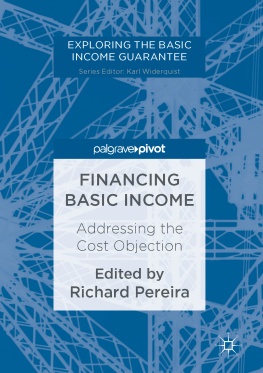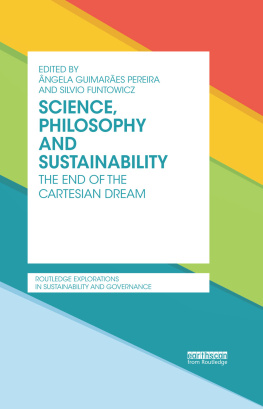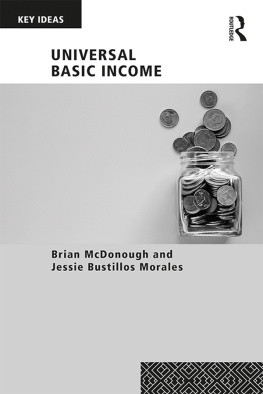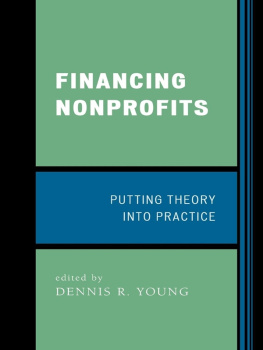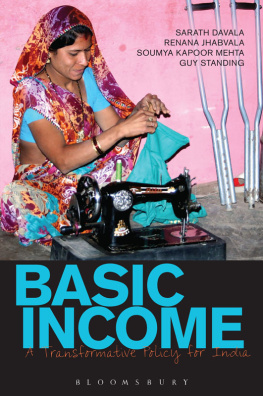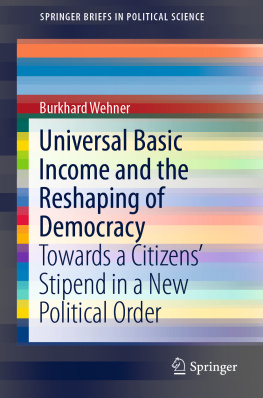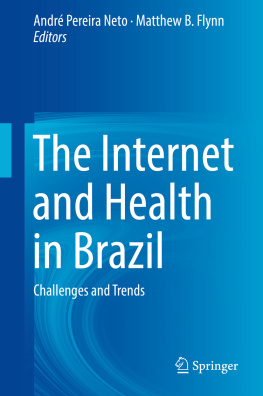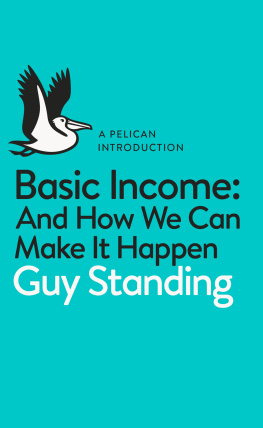1. Introduction: Financing Approaches to Basic Income
Abstract
The different ways in which basic income can be financed are set out in this chapter as a guide to reading the book. A decent basic income is presented as the goal of this work, as opposed to some basic income proposals that may be viewed as potentially worse than status quo income security programmes in various countries. Protecting vital public programmes such as universal health care or public education, for example, is essential to implementation of a decent basic income, as is setting it at a sufficient level to ensure a dignified existence and a measure of social inclusion. Proposals that set out to cut public programmes in wholesale fashion and set a low level of basic income are rejected. Income security programme redundancies are discussed in this light along with differing models and methods of financing basic income.
This book addresses the cost objection to basic income and whether a decent basic income is affordable. What are the public costs and savings of implementing basic income? It is important to emphasize that a basic income that is set too low, or below the official poverty line of a society, is not meeting the goal of a basic income as presented in the academic literature and in more common political and popular presentations of the concept. The objective of this public policy is to provide members of a society with the ability to meet basic needs and achieve a measure of social inclusion, even if they cannot find a job in the labour market to provide adequate income to satisfy these basic needs. This book sets out to meet the definitional goals of basic income and it addresses the cost objection by focusing on a decent basic income and its financial feasibility.
Also related to providing an adequate basic income is presenting a proposal which does not cut all or most other public programmes in a wholesale fashion, thereby potentially leaving members of a society in a worse financial state than under the current system. Universal public health-care programmes currently in place in many countries, and the provision of free and subsidized public education, are two examples of programmes which if eliminated in order to finance a basic income would create catastrophic costs for many people that could not be covered by the often very modest and low levels of basic income found in most proposals. The prominent work of Charles Murray provides one such approach, which is not supported by this book. Our goal is to provide a much higher level of basic income than found in proposals such as Murrays, while also preserving vital public programmes such as universal health care. We recognize that many public programmes become redundant with the implementation of basic income, and these savings can be directed to financing basic income. What differentiates this book from others is that public programme redundancies are accounted for and treated in a far more selective fashion than in other prominent proposals, and the level of basic income is set much higher than normally found in the academic literature.
Three countries on three different continents are also analysed in proposing a progressive basic income in this study. The combination of ensuring a decent level of basic income and preserving vital public programmes, such as universal health care and others detailed in the following chapters, ensures an analysis of the financial feasibility of basic income which does not undermine or contradict the objectives of this policy initiative. We want to avoid a regressive basic income proposal, which could leave individuals worse off than under the status quo.
Basic Income Models
The two most common approaches to providing a universal basic income are a negative income tax (NIT) and demogrant. The NIT tops up the income of individuals who fall below a certain threshold (this could be the official poverty line, or something higher, for instance). The demogrant refers to a basic income provided to everyone regardless of income. This latter version will usually be paid back in part or in full through existing income tax regimes by individuals whose incomes are above a threshold. The demogrant is paid to all adults and can include provision for a basic income demogrant for children often set at one-half or one-third of the adult amount for children in many proposals.
A third approach is to pay a universal dividend to members of a society, such as is paid annually in Alaska. This is a type of demogrant, although a variable one which fluctuates significantly from year to year and is usually based on the natural resources of a society. The universal dividend is not a basic income as per the common definition of the term, however if provided at a sufficient level it can meet (and exceed) the goals of a basic income. In this book a universal dividend model is explored as a way to buttress and add to basic income proposals, and possibly provide a superior universal payment as compared with many basic income proposals previously on offer. A universal dividend is based on common wealth in society such as land, natural resources such as oil, forests and minerals, and social resources. A portion of the profits from these common, natural and social assets is shared equally among members of society in a universal fashion.
Combining a basic income with a universal dividend can present a robust new approach to income security in the twenty-first century. A basic income can eliminate (or significantly reduce) some of the most oppressive and inefficient bureaucracies by transferring this public money directly to those most in need, creating a higher degree of empowerment and freedom for those unable to access stable or lucrative employment. It can eliminate a lot of waste of public resources and provide significant public savings. A universal dividend can distribute the excess profits (or economic rent) found in many sectors, particularly where natural resource wealth is concerned, to augment the basic income.
Financing Approaches
Most commonly, basic income proposals rearrange existing income transfers and combine them into a single basic income programme. Welfare payments and their associated bureaucracies are eliminated, and numerous other related programmes are similarly streamlined into one more efficient, de-bureaucratized basic income. Publicly provided pensions, various child benefit programmes the state may have in place, food allowances or food stamps, special tax deductions for low-income households (and tax deductions for high-income households), social housing programmes and payments, charities to address national poverty issues, all can be viewed as partially or fully redundant with a basic income in place. Eliminating much of this complexity and cost can allow for a higher basic income payment than what individuals currently receive from various income support programmes.
In addition to these savings which go towards financing basic income, it is common to discuss a rearranging of the tax system to help finance basic income, particularly a basic income at a decent level. Some proposals exclusively focus on increasing the progressive income tax rate structure already in place, that is, the more income one has the higher the marginal tax rate one pays (see, e.g., Appendix 2 for historical marginal tax rates in the United States). In his chapter Pereira contends that if we first address tax leakages, such as tax evasion and avoidance through tax havens and numerous tax shelters, personal income taxes do not have to be raised to provide a universal basic income. A personal tax cut could be implemented along with introduction of basic income Pereira claims, as savings from programme redundancies are so significant, combined with addressing tax leakage.

